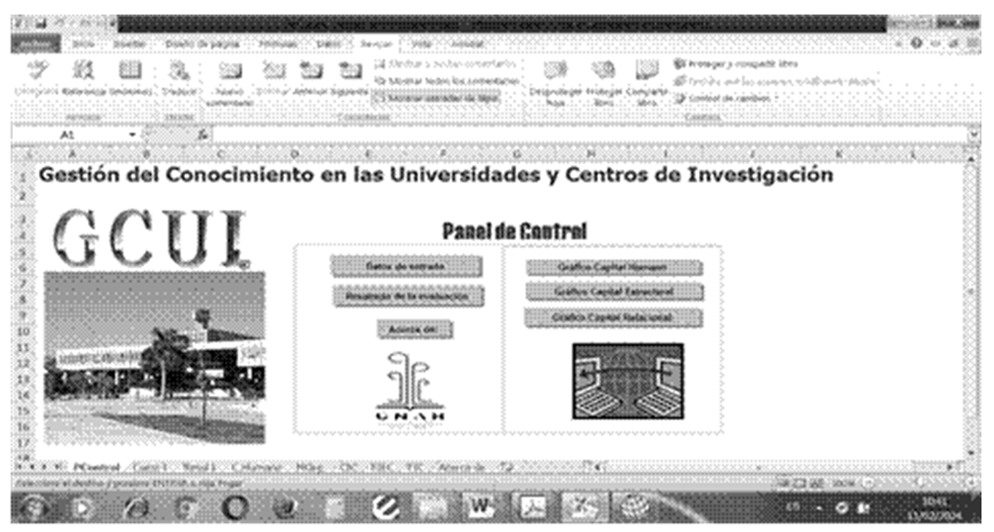Automated System to Evaluate Knowledge Management in Universities and Research Centers
Main Article Content
Abstract
Knowledge emerges as a growing force that can mobilize and drive social development; therefore, it is necessary, based on scientific contributions about the regularities of this process and the elements that empower man as a transformer of his realities, himself, his culture and his society. Being able to use new processes, such as Knowledge Management, that enable the training of individuals, professionals, capable of responding to the demands of the contemporary world. Taking into account the above, this work proposes an automated system called Knowledge Management in Universities and Research Units (GCUI) for its acronym in Spanish, for the evaluation of knowledge management in university and scientific institutions. For this purpose, 40 indicators proposed by Inche and Álvarez in 2007 were used, distributed in the dimensions’ human capital, structural capital and relational capital. The automated system allows you to quickly and accurately diagnose, control, measure and compare intellectual capital, the most important in an organization.
Article Details

This work is licensed under a Creative Commons Attribution-NonCommercial 4.0 International License.
Aquellos autores/as que tengan publicaciones con esta revista, aceptan los términos siguientes:
- Los autores/as conservarán sus derechos de autor y garantizarán a la revista el derecho de primera publicación de su obra, el cuál estará simultáneamente sujeto a la Licencia de reconocimiento-no comercial de Creative Commons 4.0 que permite a terceros compartir la obra siempre que se indique su autor y su primera publicación esta revista. Bajo esta licencia el autor será libre de:
- Compartir — copiar y redistribuir el material en cualquier medio o formato
- Adaptar — remezclar, transformar y crear a partir del material
- El licenciador no puede revocar estas libertades mientras cumpla con los términos de la licencia
Bajo las siguientes condiciones:
- Reconocimiento — Debe reconocer adecuadamente la autoría, proporcionar un enlace a la licencia e indicar si se han realizado cambios. Puede hacerlo de cualquier manera razonable, pero no de una manera que sugiera que tiene el apoyo del licenciador o lo recibe por el uso que hace.
- NoComercial — No puede utilizar el material para una finalidad comercial.
- No hay restricciones adicionales — No puede aplicar términos legales o medidas tecnológicas que legalmente restrinjan realizar aquello que la licencia permite.
- Los autores/as podrán adoptar otros acuerdos de licencia no exclusiva de distribución de la versión de la obra publicada (p. ej.: depositarla en un archivo telemático institucional o publicarla en un volumen monográfico) siempre que se indique la publicación inicial en esta revista.
- Se permite y recomienda a los autores/as difundir su obra a través de Internet (p. ej.: en archivos telemáticos institucionales o en su página web) antes y durante el proceso de envío, lo cual puede producir intercambios interesantes y aumentar las citas de la obra publicada. (Véase El efecto del acceso abierto).
References
Álvarez, S. D., Goyes, J., & Poveda, T. C. (2021). La gestión del conocimiento y el rendimiento académico en la carrera de Turismo de la Universidad Regional Autónoma de Los Andes-Ecuador. Universidad Y Sociedad, 13(S3), 86-96, ISSN: 2218-3620.
Araya, S., Henríquez, C., Ramírez, P., & Barra, A. (2019). Explorando la relación entre gestión del conocimiento y el rendimiento organizativo en instituciones de educación superior universitaria. Revista Ibérica de Sistemas e tecnologías de Informação, E17, 947-959, ISSN: 1646-9895, Publisher: Associação Ibérica de Sistemas e Tecnologías de Informação.
Artiles, S., & González, F. (2004). La Gestión del Conocimiento. GECYT: Un caso de estudio (Un enfoque gerencial). Editorial Academia, La Habana, Cuba.
de Hoyos, E. (2006). Tecnologías de la información en la gestión de servicios deportivos. Nuevas Tecnologías Aplicadas al Deporte Municipal. FMM, diciembre, Madrid, España. www.tdsoftware.es
Hernández, R. (2004). Activos intangibles. Enfoques para su medición (Gestión del Conocimiento. Un enfoque gerencial). Editorial Academia, La Habana, Cuba.
Inche, M., & Álvarez, J. (2007). Indicadores de gestión del conocimiento. Ciencia en su PC, 2, Publisher: Centro de Información y Gestión Tecnológica de Santiago de Cuba.
Nogueira, D., Gómez, C., Nogueira, D., & Salas, W. (2018). Gestión del conocimiento mediante el observatorio científico. Editorial Jurídica del Ecuador.
Nonaka, I. (2000). Gestión del conocimiento. La empresa creadora de conocimiento (Vol. 72). Harvard Bussiness Review, España: Deusto.
Reyes, R. M., Martínez, Y., & Rodríguez, S. C. (2011). La universidad cubana, gestión de conocimiento, tecnología y sociedad. Su modelo educativo en la experiencia de Yaguajay. Economía y Desarrollo, 146(1-2), 130-142, ISSN: 0252-8584, Publisher: Universidad de La Habana, Cuba.
Ruano, A. O. (2012). La gestión del conocimiento en el deporte: Una necesidad actual. Educación Física y Deportes (Efdeportes), 16(164).
Ruano, O., León, B., & Rodríguez, B. (2014). Gestión del conocimiento y entrenamiento.
Villasana, M., Hernández, P., & Ramírez, E. (2021). La gestión del conocimiento, pasado, presente y futuro. Trascender, Contabilidad y Gestión, 6(18).
